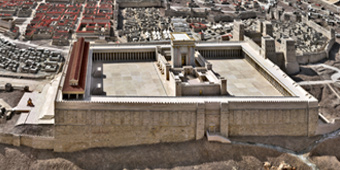
Rebuilding Our Holy Temple
For our “seven lights” to be holy, we must actively seek holiness to nourish our spiritual senses, within the physical framework of this world...

Lately, I contemplated the changes we have made to our home since doing teshuva, and the constant vigil we need to keep in order that our home should be a haven of holiness for our family. It’s not easy in this enticing world we live in, even when we are fully aware of the dangers. Our developing spiritual awareness brings with it new and subtle challenges from the other side of the tracks: our Evil Inclination. Thankfully for us, we have Rabbi Nachman’s advice to help us navigate these murky waters…
I also started thinking about the Mishkan, The Holy Tabernacle, and the Menorah, after a friend of ours came over last night with a tale of teenage woe regarding his increasingly wayward son, and a serious breach of modesty in their home
Mishkanmeans ‘dwelling’, and the Mishkan was called this since it was to be Hashem’s dwelling place in this world. Our Sages teach us that since we no longer have our Holy Temple, the Jewish Home, our home, has become our Mishkan. Our home is where we generate holiness for ourselves and our family. Our home is where we spend most of our collective time and therefore can potentially concentrate much of our Torah observance. Our home is a place that the Shechina, Hashem’s presence, can dwell in: depending on how we behave in it. The amount of Hashem’s light we let into our homes directly parallels the amount of light that will come out from it, G-d willing.

Here’s where the Menorah comes in. Rabbi Nachman teaches that the seven lights of the Menorah of the Temple correspond to the seven lights of holiness in ourselves: Our two eyes, two ears, two nostrils and one mouth. Seven instruments of potential holiness with which we can bring much light to our world: but if abused, can harm us deeply, physically and spiritually. The metaphor here is that the holiness of our homes depends on the holiness of our seven lights: our senses of sight, smell, speech and hearing.
So when my husband and I did teshuva with our (then) three children in tow, we didn’t know any of this. Lucky for us, however, our divine souls within us sent us plenty of messages, usually in the form of a quiet, then increasingly insistent voice. Although many people thought it was difficult for us to go through this with children, albeit very young, in fact it was a blessing since their presence was the greatest influence in making the changes we did and in identifying the spiritual pitfalls. The first area I tackled after my mode of dress was how I ‘dressed’ our home.
Now don’t think I’m talking about obvious ‘evils’ such as movies and trashy tabloid magazines (the first things to go). One of the things I quickly realized was the sneaky subtlety with which we indoctrinate our children about what is important to us, without even realizing it, in the way we arrange our homes. For example, we were already mitzvah observant, to a degree. I had all the Shabbat “accessories”: candles, Kiddush cups, Havdalah set: all tucked away neatly into my stylish antique cupboard during the week: and ‘dragged’ out for 24 hours over Shabbat. They didn’t quite match my décor (or my inflated image of myself as an amateur home stylist) so back they went as soon as Shabbat was over, to be replaced by a trendy assortment of jars and vases. I was signalling to my children that style was more important than our heritage. So even though they were enrolled in religious education I was subtly shooting myself, and them, in the proverbial foot.
Our paintings were the next thing to go. Hanging on the wall was a gallery-style array of famous stylish geometric nothingness. No immodest nudes or abstract suggestiveness, but since the ‘art’ was smack bang on the central lounge wall, it was therefore important to us as far as appearances went: and so they, too, hit the streets, literally. But it took me a long time to find replacements. As you have probably noticed, I’m a stickler for style, and who said religion can’t be stylish?! I am determined to prove the pundits wrong. You are all invited to my house to see a funky collection of old photos, tzaddikim and holy sites on the walls – including a gorgeous original painting – of the Mishkan – by a young Breslever artist who just “happened” to turn up on our doorstep one night hawking his stunning wares…
Next on the list: the bookshelves. We already had a fairly extensive collection of sifrei kodesh, holy books, thanks to my enthusiastic husband (who patiently suffered his less enthusiastic wife for 10 years). But I wasn’t too keen on their various shades of decidedly uncool dark browns and mahoganys, and again, they just weren’t ‘me’. They too, were relegated to the study bookshelf whilst our selection of more ‘socially impressive’ bestsellers, arthouse novels, history books, and coffee table tomes were on display in the lounge. Here again was the subtle message of style versus substance. And I was definitely a “substance” abuser of the first degree.
The pattern was clear. According to Rabbi Nachman’s menorah, I was damaging our eyes, no matter how subtly. When someone entered our home, they would have been hard pressed to figure out we were observant Jews, if Jews at all.
The lesson I learned was that for our seven lights to be holy, we don’t only need to refrain from abusing them, but we need to actively seek holiness to nourish our spiritual senses, within the physical framework of this world: in other words, to elevate our physical lives. Rabbi Nachman once said, that we need to show compassion and mercy toward our bodies, for they, too, want to serve Hashem. What a groundbreaking concept!!! And, a life-changing one for me. I knew I had to change our physical surroundings, and fast, if I wanted the kids to realize we were serious. So out came all the religious artifacts, and holy books: the rest of the books were moved out of the lounge, then packed away, and one day, finally: sold. Stage one complete. The effect was palpable.
We were Rebuilding Our Temple. Our eyes beheld it, our souls felt it.
Next in line was my mouth. Rabbi Nachman teaches that each of the 70 nations has a national vice, which is deeply embedded within the national consciousness and character. Being an Australian, I’m guessing that for Aussies it’s our vulgar humor. And that had to GO, along with a few choice words which still popped up, even with children present. It was difficult, since humor was such a definitive part of my character. Slowly, painfully, I forced myself not to quip wittily during conversations because I would inevitably slide into dirty innuendo. It was (and still is) particularly hard with certain good friends and family members who were used to a certain repartee. However, I knew that I was ‘purifying the camp,’ stuck to my guns, and somehow learned to be funny in a different way. Stage Two (almost) complete. No-one’s perfect! And I’m still a major work in progress when it comes to innocent gossip, if there is such a thing. But progress is the key word when Rebuilding Your Temple…
Stage Three was probably the hardest: Ears. I am a musician and so my taste in music has always been a big part of who I am. I also love to dance, and am (was? still am?) particularly fond of seventies funk, and jazz. But oh, how dangerous it was for me to hear those rhythms!!!! I would literally forget myself for a few moments and be transported back into those other times; decadent, immoral and not-so-great ‘good’ times…… and as fast as you could say “James Brown”, packed away another part of my life into boxes and sold it back, happily, to the Devil.
And so we subtly, slowly but surely transformed our home and rid ourselves of our passive material accomplices to the degradation of our Mishkan. We felt lighter, literally and figuratively: physically and spiritually. Rabbi Chaim Kramer wrote in the book “Hidden Treasures” that the body is the interface for the soul. So too, is our home. When you walk around your home, does it represent who you think you are, or who you REALLY are?
Two things happened after all this ‘spiritual sorting’, our domestic version of what is called ‘biyyur’ as represented in the mitzvah of checking food for insects: Firstly, we became a lot more sensitive to the coarse world around us and were a lot more careful about who we let into our home. Secondly, getting our material affectations out of the way led us to getting in touch with our souls. Instead of talking about the latest ‘thing’: we were talking about spiritual concepts and Torah. Another point for the mouth. Wow. What a difference. And add a point for the ears, too, since the kids were listening, and absorbing.
As for my nose, well, that’s quite a tricky one to explain since there are some very deep concepts linking the nose to Messiah, and prayer – I engaged early on in daily hitbodedut, personal prayer, which is a subject that has affected my life in such a way as to require an entire library of articles. But suffice to say that I finally, after much hemming and hawing, took up baking my own challahs for Shabbat, and persisted in it weekly, no matter how hard, heavy or crumbly they were at the table. The smell of the baking was heavenly, entwined with the burnt smell of the portion of “challah” for the Kohanim, and that was enough for our Mishkan.
Rabbi Brody taught in his shiur, Face to Face, that the Mishkan in this world corresponds to the Mishkan in the Upper worlds, that is, the Holy Dwelling Place of Hashem Himself, His Holy Throne. And that all the objects in the Mishkan had infinitely profound meanings and impact far beyond time and space. We can also relate this concept to our homes, since we are influencing future generations. If we imbue our homes and possessions with eternal meaning, then our children will take this with them and pass it on, G-d Willing, to their children, and so on. Since each mitzvah is eternal, the potential for Holiness is infinite.
We are finally Rebuilding Our Temple, this time, G-d Willing, to last.







2/24/2011
praise and suggestion this is a great piece. it really illumines how our home, speech, and behaviors can help or hinder us. excellent!!! one suggestion: where you talk about rhythms…for the average reader, the sudden sentence about 'sold back to the devil etc'. may appear harsh. i don't know if it's constructive to describe james brown or lots of popular music that way. perhaps simply describing popular music in another way? harmful, 'lower nature', manipulating one's emotions and desires? i don't know how to say it. i just didn't want people to be 'turned off' to an otherwise very valuable article.
2/24/2011
this is a great piece. it really illumines how our home, speech, and behaviors can help or hinder us. excellent!!! one suggestion: where you talk about rhythms…for the average reader, the sudden sentence about 'sold back to the devil etc'. may appear harsh. i don't know if it's constructive to describe james brown or lots of popular music that way. perhaps simply describing popular music in another way? harmful, 'lower nature', manipulating one's emotions and desires? i don't know how to say it. i just didn't want people to be 'turned off' to an otherwise very valuable article.